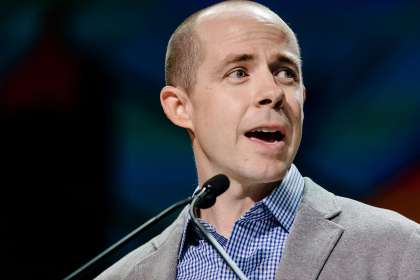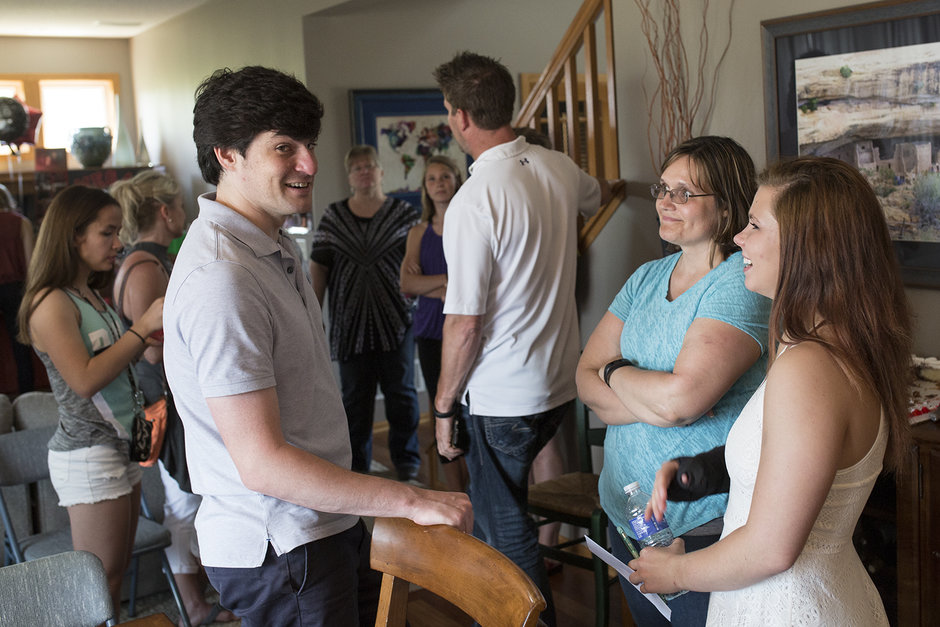Advertisement
As leading Democrats fight for ballot access, voting rights and diverse representation, their marquee presidential contest is hard to participate in and takes place in a state that is 90 percent white.

DES MOINES — Even the Democrats trying to win the Iowa caucuses won’t defend them.
Since the 1970s, Iowa has hosted the country’s first nominating contests, with a singular ability to make or break White House hopes. Yet with less than three months to go, the state’s pre-eminent position — and the caucus process itself — is once again taking heat.
Former Vice President Joseph R. Biden Jr. said this week — to an Iowa reporter no less — that the caucuses were not “representative.”
Senator Elizabeth Warren demurred when she was asked at a forum in South Carolina whether the order of the early-nominating states should change because Iowa and New Hampshire were “two of the whitest states in the country.” “Are you actually going to ask me to sit here and criticize Iowa and New Hampshire?” she said. “I’m just a player in the game.”
And Julián Castro, the former secretary of housing and urban development, said Iowa was “not reflective of the United States” and “not reflective of the Democratic Party.” He called for the state to lose its spot at the front of the presidential nominating calendar.
In Iowa, fretting about the caucuses is a quadrennial tradition among Democratic and Republican officials alike. But at a time when leading Democrats have made the fight for ballot access, voting rights and diverse representation core principles, their marquee presidential contest offers none of those elements.
The state is more than 90 percent white, rankling officials and activists who say it does not match the party’s diversity elsewhere. The caucuses take place on a Monday night in frigid early February, disenfranchising Iowans who cannot attend because they have to work, have child care obligations, are disabled or are out of state.
The grumbling reached a roar over the last week, amplified by the possibility that Michael R. Bloomberg might enter the Democratic presidential contest and bypass the four early states, a strategy that if successful could render Iowa irrelevant for good.
After touching off the latest round of Iowa pearl-clutching with a vigorous denunciation, Mr. Castro has continued to speak out against the primary schedule. It has become one of the few avenues for his struggling campaign to receive attention.
“We can’t as a Democratic Party continually and justifiably complain about Republicans who suppress the votes of people of color and then turn around and start our nominating contest in two states that, even though they take their role seriously, hardly have any people of color,” he said.
Iowa officials are accustomed to twisting themselves into rhetorical pretzels to justify the state’s antiquated caucus system. They have argued it gives lesser-known candidates — like Jimmy Carter in 1976 — an opportunity to parlay retail politicking skills into an electoral breakout.
They’ve used their political clout to keep the first spot in line. When Tom Perez, the chairman of the Democratic National Committee, was campaigning for his post in 2017, he got the Iowa delegation to switch its support to him after pledging to protect Iowa’s first-in-the-nation status. (Other candidates for party chair, including Mayor Pete Buttigieg of South Bend, Ind., also pledged to keep Iowa first.) Mr. Perez declined to be interviewed about the Iowa caucuses.
Troy Price, the chairman of the Iowa Democratic Party, argued in an interview Tuesday that Iowa’s population, which is 90.7 percent white, was in fact plenty diverse.
“Those who say that diverse voices are not being heard need to spend more time here in Iowa,” Mr. Price said. “Everyone thinks that the only thing Iowans talk about is corn and that the only thing we talk about is the ag economy, and that’s just simply not true.”
But asking other Iowa Democrats to defend the caucuses this week led to a series of deep sighs and requests to speak off the record, before many privately acknowledged that the process was indefensible as a matter of democracy.
Zach Simonson, the Democratic chairman in Wapello County, admitted: “It’s a terrible way to do Democratic decision-making.”
Others made more a parochial argument: It is good to be first.
“If Iowa changed to a primary, we’d be dead,” said Claire Celsi, a Democratic state senator from West Des Moines. “There would be nothing special about it, so I’m against that. I think we should stay a caucus state, as long as we can figure out the inclusion piece — because without that, the caucuses are no good.”
Donna Brazile, the former D.N.C. chairwoman, has been traveling to Iowa since she worked for Jesse Jackson’s first presidential campaign in 1984. She said Iowa could be trusted with first-in-the-nation status because the state’s well-informed electorate takes the responsibility of choosing a presidential nominee more seriously than voters elsewhere.
“While it doesn’t look like America, when they take into consideration the qualities and values we’re looking for in a candidate, I believe that they represent what is truly best about our country,” Ms. Brazile said. “They’re smart and they take this seriously.”
Still, grievances from other states are growing louder.
In Texas, the nation’s second-largest state and one where a majority of Democratic primary voters are likely to be black or Hispanic, Gilberto Hinojosa, the chairman of the state’s Democratic Party, said he was having trouble getting presidential candidates to commit to attending a planned January forum before the March 3 primary. They all have told him they’ll be too busy in Iowa.
“It is not right that we have a caucus in Iowa that makes it difficult for people to vote, and right after that a primary in New Hampshire, in a little tiny state that does not represent the diversity of America,” Mr. Hinojosa said. “It is bizarre. It makes absolutely no sense except for tradition, and sometimes tradition doesn’t get us anywhere.”
Mr. Hinojosa said he planned to push to change the nominating calendar before the party’s next contested primary.
Elaine Kamarck, a member of the D.N.C.’s rules committee who wrote a book about the presidential nominating process, said concerns about caucus accessibility and a lack of diversity in Iowa have long been outweighed by a belief that “there’s a quality to the participation in a caucus state that you don’t get in a primary.”
With turnout for Iowa’s Feb. 3 Democratic caucuses expected to top the 2008 high-water mark of 240,000 people, Ms. Kamarck said there were growing concerns that Iowa Democrats did not have the infrastructure necessary to accommodate record caucus turnout.
“It’s really, really hard for a state party every four years to do what a state government does with absolute regularity,” she said.
The past two Iowa caucuses have not gone smoothly. In 2012, the Republican Party of Iowa declared Mitt Romney the winner by eight votes on caucus night. Two weeks later it amended the results, saying that Rick Santorum had actually won. Four years later, Hillary Clinton and Bernie Sanders fought to a virtual draw in Iowa. Mr. Sanders called for the raw vote totals to be released, but the state party hadn’t kept track — officials had only counted the delegates that had been awarded.
After the 2016 election, the D.N.C. encouraged the 10 states that held caucuses to switch to primaries to involve more people in the nominating process. For the three remaining caucus states that refused to switch to primaries — Iowa, Nevada and Wyoming — the D.N.C. required state parties to allow some sort of absentee participation and devise a mechanism to conduct a recount and count raw votes.
Iowa’s initial plan to allow remote caucusing by phone ahead of the Feb. 3 contest was foiled when the D.N.C. security team easily hacked into the prototype system. Instead, Iowa Democrats plan to allow “satellite caucuses” that enable people to participate remotely. Their votes will count for a fraction of what they would if they attended one of 1,678 sanctioned caucuses.
To allow for a possible recount, Iowa Democrats plan to report both the delegate and supporter totals for each candidate, opening the possibility of two different candidates declaring victory in Iowa — one who wins the most delegates and another who claims the most support from actual humans.
“The D.N.C. recognizes the critical role the early states play in the nominating process, and Democrats are making historic efforts to increase the accessibility of the caucuses and primaries to ensure more voters participate than ever before,” said David Bergstein, a party spokesman.
Myriad efforts to strip Iowa and New Hampshire of their coveted positions have failed in recent years. New Hampshire law stipulates that it holds the nation’s first primary, and Iowa has received dispensation from the Democratic and Republican National Committees to hold the nation’s first caucuses.
“We’ve tried all different ways of knocking them out of first and second,” Harry Reid, the former Senate majority leader, said of Iowa and New Hampshire. Before the 2008 campaign, Mr. Reid managed to get his home state of Nevada locked into the third spot on the Democratic presidential nominating calendar.
Asked if there was any way to justify Iowa and New Hampshire’s positions, Mr. Reid replied: “None whatsoever. But they’re going to be there, we might as well move on.”
Sydney Ember reported from Des Moines, and Reid J. Epstein from Washington. Thomas Kaplan contributed reporting from Orangeburg, S.C.



